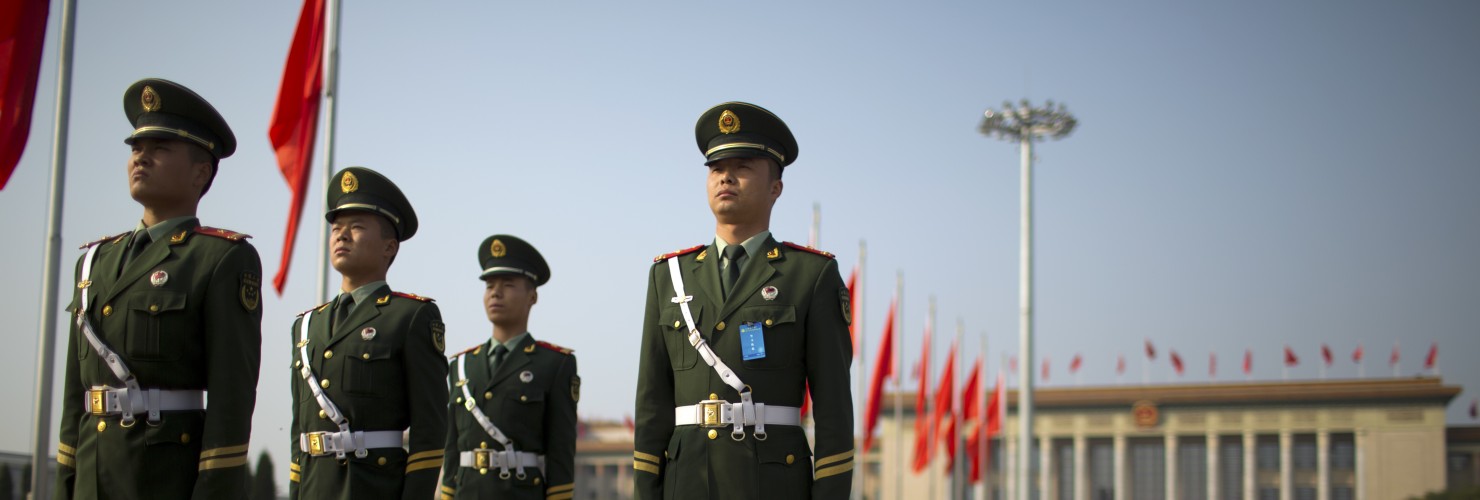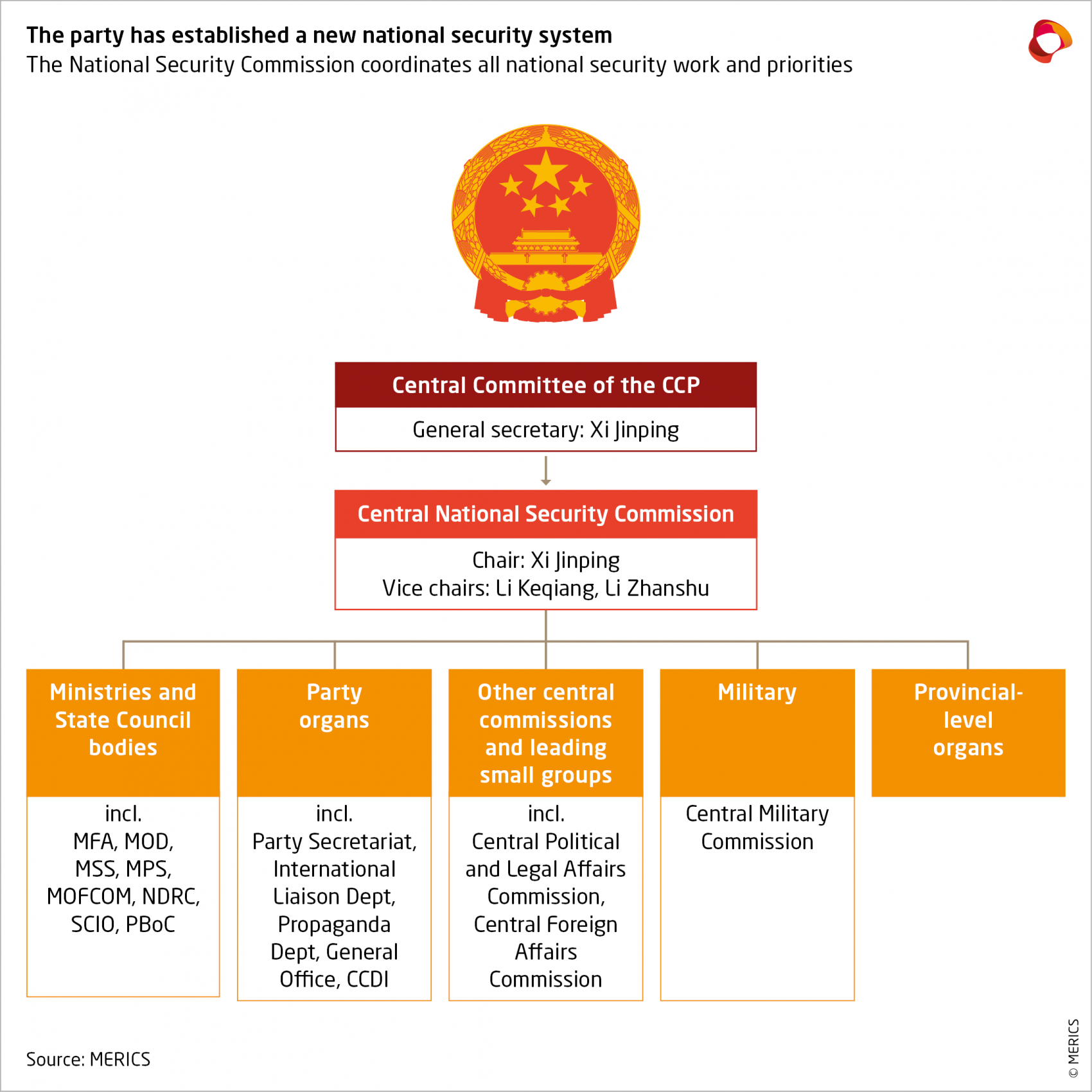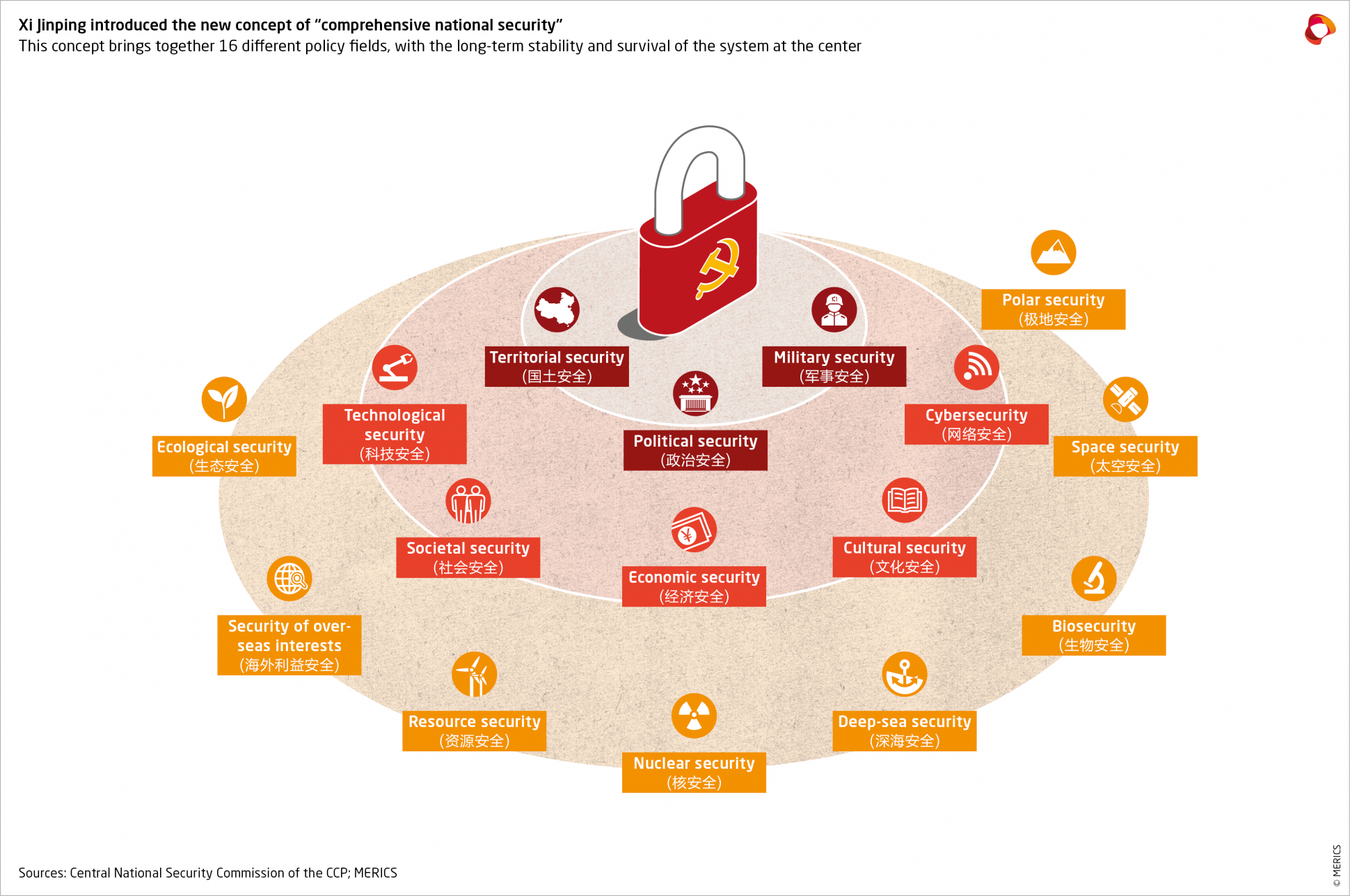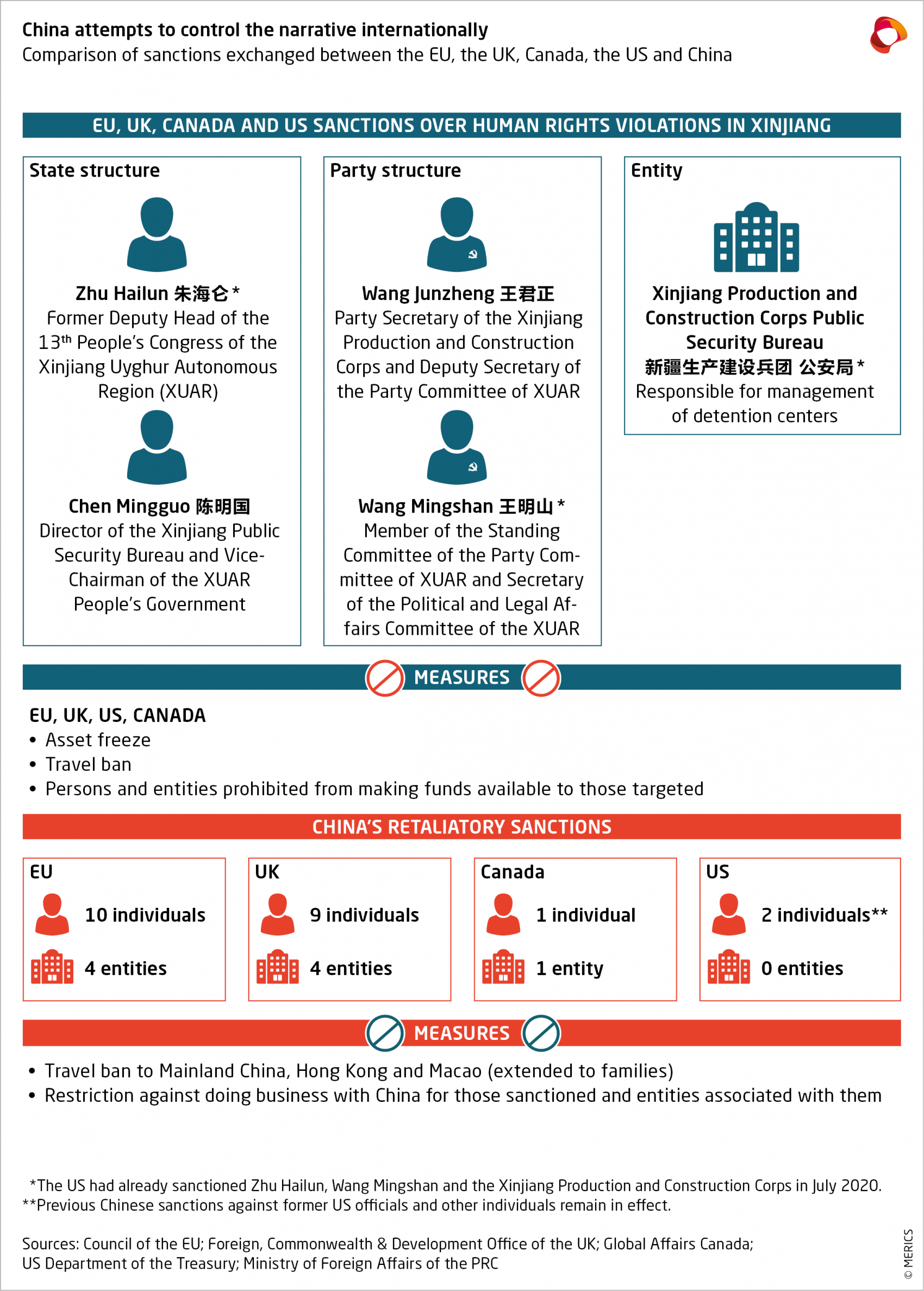

China’s new international paradigm: security first
by Helena Legarda
 You are reading chapter 3 of the MERICS Paper on China "The CCP's next century: expanding economic control, digital governance and national security". Click here to go to the table of contents.
You are reading chapter 3 of the MERICS Paper on China "The CCP's next century: expanding economic control, digital governance and national security". Click here to go to the table of contents.
Key findings
- The CCP has established a centralized and unified national security system built around the concept of “comprehensive national security.” Reaching into all areas of policy, the party aims to increase its control over both its internal and external environments.
- Since Xi Jinping came to power, protecting China’s national security has risen to the top of the party’s agenda. Cooperation and compromise with the West have been set aside in favor of a more proactive mode of action meant to make the world safer for the CCP in the long run.
- From trade ties with other countries to China’s global image and reputation – everything has become a matter of national security.
- This new approach involves the party taking forceful preemptive action against perceived threats to its rule, pursuing the extraterritorial application of Chinese laws and trying to enforce formerly domestic red lines overseas.
- Other countries must be prepared to deal with a Chinese leadership that will respond forcefully to any perceived criticism or attack against its interests, and that is ready to escalate any conflicts if matters of national security are concerned.
- As the party refocuses its efforts towards achieving its 2035 and 2049 goals, this securitization of China’s international behavior is only likely to be intensified.
1. The party goes on the offensive: the era of low-profile foreign policy has been left behind
Over the last few years, but especially since Xi Jinping came to power in 2012, China has adopted a substantially more assertive foreign policy and altered its international behavior. Underlying this new approach is the party’s new and expanded concept of national security, which encompasses almost every policy field. Even China’s all-important development goals have been subsumed within the protection of China’s national security, with the ultimate goal of preserving the long-term survival and stability of the system.
The change in approach, visible in traditional diplomacy and many other policy fields, reflects both the party’s confidence and ambitions - and its fears and insecurities. China’s global push demonstrates confidence and forms part of the struggle for “the great rejuvenation of the Chinese nation” (中华民族伟大复兴), a concept introduced by Xi in 2012.1 Its goal is to restore China to its former status as a global power by 2049. In Beijing’s eyes, China is not a rising power, but a returning one. The Western-dominated global order is viewed as a historical anomaly that therefore can – and must – be reversed.
The party’s belief is that China is in a “period of strategic opportunity” (战略机遇期), making this the perfect time to take a more central role in the international arena. After two decades of economic growth and military modernization, Beijing feels sufficiently confident in its own strengths and capabilities. Furthermore, it regards the international environment as unlikely to pose any significant challenges to China’s ambitions, with the West in decline and distracted by its own internal issues.
At the same time, China’s new international posture must also be understood as a reflection of the CCP’s threat perceptions. It is an extension of the party’s fundamental mission, which is to preserve regime stability and survival. The CCP’s worldview is marked by a feeling of being under siege, surrounded by Western countries and their allies who are intent on containing China and subverting the CCP’s hold on power, with the ultimate goal of provoking regime change.
Under Xi, the party’s long-standing strategy of erecting barriers to keep threatening Western ideas and influence out of China so as to guarantee the party’s survival has become more rigid. However, an outward-looking parallel strategy has also been rolled out. A new ideological and policy framework, built around Xi’s concept of “comprehensive national security” (总体国家安全), has been established to tackle threats to China and the party that flow from China’s growing integration in, and exposure to, the outside world.
The CCP has established a centralized and unified national security system with the National Security Commission, chaired by Xi, at the top. And it has passed legislation in order to institutionalize this new outlook, including the National Security Law, the National Intelligence Law and the Cybersecurity Law, among others. Reaching into all areas of policy, the party aims to increase its control over both its internal and external environments, with a view to turning China into a global power by 2049.
With this new model, the party has turned from the passive or reactive defense of China’s national security to a more proactive, and at times even preemptive, approach meant to tackle any threats to the current system and shape the international environment to make it safer for the CCP in the long run. China’s national security state, formerly mostly kept within China’s borders, is now expanding internationally.
2. A new model: national security is redefined and governs the party’s agenda
Preserving the system’s stability and survival has long been the party’s top priority; national security has always been seen as the bedrock of these efforts. At the foundation of the People’s Republic of China (PRC), the leadership was initially laser-focused on traditional security issues. The emphasis was on preserving China’s independence and territorial integrity against US or Soviet aggression, and on protecting the system from “counterrevolutionary elements.”
It was only in the late 1970s, as the risk of war seemed to have receded, that the CCP incorporated non-traditional security elements into its concept of national security. As China opened up to the world during a time of global economic growth and industrial modernization, issues such as economic security, transnational crime and ideological security rose up the party’s security agenda. New tools were needed as the military and other security forces were no longer considered sufficient protection.
At the same time, however, this was a period when China’s development goals were at the forefront of party policies. Without abandoning the focus on traditional security concerns, the “reform and opening up” period also brought with it an understanding that guaranteeing China’s economic growth must take precedence. Economic development was seen as the key to the country and the system’s long-term stability. This, in turn, would require cooperation and compromise with the West.
For a while, China therefore pursued a path of integration into the international community – joining the WTO and other international organizations and engaging in diplomacy and exchanges with the rest of the world even on sensitive issues like human rights.
Only with the arrival of Xi did the party put security front and center again: development goals were subsumed within the protection of China’s national security. In response to global trends towards greater instability – and thus heightened threats to the party – after the 2008 global financial crisis and the United States’ pivot to Asia, Xi expanded on the traditional concept of national security. In 2014, shortly after coming to power, he articulated his new concept of comprehensive national security during the first meeting of the newly established National Security Commission.2 This was a new vision of national security, intended to bring together different policy fields and strands under an overarching framework.
The concept currently encompasses 16 types of security - though the number is constantly growing - including traditional security areas such as political security, territorial security, and military security, alongside new areas such as cultural security, scientific security and the security of China’s overseas interests.3
The underlying logic behind this new outlook is the integration of development and security (统筹发展和安全): development is seen as “the basis for security, and security as the condition for development” (发展是安全的基础,安全是发展的条件).4 National security has thus become the central element in the party’s strategy to maintain China’s economic growth and continued development which is, in turn, one of the CCP’s main sources of legitimacy. This view clearly connects national security to the party’s own struggle for long-term stability and survival. Since protecting China’s national security rose to the top of the party’s agenda, cooperation and compromise with the West have been set aside in favor of a more proactive mode of action.
3. International environment: the CCP is on the alert for external threats to domestic stability
Links between internal and external security are seen as key issues for the new national security system to focus on.5 National security has broadened from protecting China against military attack by the US or others. The new, expanded template covers all policy areas and actors – domestic or international – that could impact China’s development and therefore the CCP’s legitimacy, or harm political and social stability. From trade ties with other countries to China’s global image and reputation – everything has become a matter of national security.
Developments over the last few years have only underscored the importance of the international side of this equation. The party, in a nutshell, sees clear external challenges to its power and stability that must be tackled to reach its 2035 and 2049 goals. US trade sanctions and the blacklisting of multiple Chinese firms has demonstrated the vulnerability of China’s economy and industrial bases, given their dependence on foreign markets and suppliers for key components, such as chips.6
The emergence of a new transatlantic cooperation agenda that includes China policy and extends to the NATO space, along with increased cooperation among the Quad member countries, has highlighted the risk that a coalition to contain China’s rise may be in the making.7 Ongoing debates in the West about China’s violations of human rights in Xinjiang and Hong Kong have made clear to the party that its image as a responsible global power that will rise peacefully is in jeopardy. And the Covid-19 pandemic has further clarified that China’s security in the face of global challenges is dependent on the policies and decisions of other countries.
Under the new model, the passive defense of China’s national security is no longer felt to be enough, as there are many developments that might turn into existential threats for the party, if left unmanaged. The party has therefore decided to move towards proactively shaping the international environment in order to make the world safer for the CCP in the long run. Xi’s dictums that the party wants to build a “new type of international relations” (新型国际关系)8 and a “human community with shared destiny” (人类命运共同体),9 one element of which is a “security community” (安全共同体), and play a central role in reforming the global order are all logical next steps in this process. The CCP hopes that by increasing control over its external environment and reshaping the global order in its image, it can preempt any threats to its rule emanating from Western liberal democracies.
In essence, the party sees this as a fraught moment for China. Although the party has rapidly and efficiently expanded its domestic mechanisms of control, the international environment remains a challenge. The 14th Five-Year Plan (FYP), released in March 2021, notes that China’s “development environment is facing profound and complex changes,” which include a new scientific and technological revolution, industrial transformation, and deep shifts in the international balance of power. “Instability and uncertainty have increased significantly,” according to the plan, as the world enters a period of turbulent change, accelerated by the Covid-19 pandemic and its economic impact.
The plan cites current trends towards deglobalization – a veiled reference to US-China tensions and efforts towards economic decoupling – and a volatile global political landscape.10 These changes, which are indirectly blamed on the United States (“unilateralism, protectionism and hegemony”) are seen as posing clear threats to the world’s and China’s peace and development. Control over the international environment has turned into a matter of self-defense for the party.
4. A new preemptive posture: the CCP will proactively confront potential challenges to its rule
Leaving behind the old defensive posture, the party has turned towards an increasingly proactive approach to national security. This new approach involves the party taking forceful preemptive (or even preventive) action against perceived threats to its rule, pursuing the extraterritorial application of Chinese laws and trying to enforce formerly domestic red lines overseas by attempting to control China-related narratives internationally. In this new paradigm, where all matters are seen though a security prism, the party may take any perceived slight or attack against China’s citizens, companies, overseas interests, or its image in the world as an attack on its bottom line, warranting an aggressive response.
For the rest of the world, the implications of this shift have been quick to materialize. Aggressive behavior and reactions formerly reserved for sensitive domestic issues, such as opposition to CCP rule in Xinjiang or Tibet, calls for independence in Taiwan, or human rights activism on Chinese soil, are now increasingly common on the international stage as well.
Nowhere has this shift been clearer than over Hong Kong, a city that unites the interplay between internal and external security with the CCP’s stronger extraterritorial focus and preference for taking forceful preemptive action against potential threats. The National Security Law for Hong Kong (HKNSL), passed on June 30, 2020, as part of Beijing’s broader effort to crack down on protests in defense of Hong Kong’s autonomy, nominally targets subversion, secession, terrorism and foreign interference as well as the vague offense of “collusion” with foreign entities. In practice, however, its intention is to root out threats to national security posed by the “ideological virus” that are the city’s liberal (i.e., Western-influenced) political and civic values.11
Tackling internal threats to the party’s rule is no longer enough, however. The protests that rocked Hong Kong throughout 2019, and the pro-democracy camp’s victory in the Fall 2019 elections, were deemed events that could only be due to coercion or interference by foreign actors intent on undermining the party’s rule. The HKNSL, therefore, included extraterritorial provisions that extend its jurisdiction to govern the actions of foreign individuals or organizations, irrespective of their nationality, residence, or whether they have any connections to Hong Kong. A similar provision – although less expansive in nature as it only targets the financing of activities that endanger national security – had previously been included in China’s Criminal Law through its 2011 amendment.12
Acting against China’s national security or supporting anyone who is deemed to be a threat is now a crime worldwide, regardless of the nationality of the accused. The most recent instance of these extraterritorial provisions being used was against Lee Henley Hu Xiang, a Belizean national, who was arrested in November 2019 in Guangzhou city and charged in April 2020 with “financing criminal activities against national security” according to article 107 of the Criminal Law. His crime was reportedly to have funded US-based “hostile elements” and to have "colluded with overseas anti-China forces to intervene in Hong Kong affairs."13
The trend for applying Chinese laws to activities beyond China’s borders is only going to accelerate. In early 2020, Minister of Justice Fu Zhenghua announced China would “improve the standards and procedures for the extraterritorial application of existing laws, strengthen the judicial practice of law enforcement in foreign countries, and enhance the international influence of China’s judicial practice.”14
Another example of the focus on applying Chinese laws extraterritorially in national security matters was the March 2021 sanctions that China imposed on an array of individuals and institutions in Europe, the UK, the US and Canada. The measure came as push-back against coordinated sanctions censuring four Chinese officials and one entity for human-rights abuses in Xinjiang imposed by Brussels, London, Washington and Ottawa. The official reason behind the asymmetric escalation was that the sanctioned parties “spread lies and disinformation” about China from overseas. China’s Foreign Ministry also framed it as a move to “safeguard [China’s] national sovereignty, national security and development interests”.15
Further examples of Beijing’s new preemptive approach and its efforts to enforce its own red lines overseas are seen vis a vis international debates over the risks of Huawei’s inclusion in overseas 5G networks, and steps taken following the Australian government’s calls for an independent investigation on the origins of the Covid-19 pandemic. Both were seen as threats against elements of China’s national security, such as its economic security and global reputation. Party and state officials immediately intervened on behalf of Huawei, ostensibly a private company, and issued veiled threats against Germany – or any other country – should Huawei be banned from their 5G network rollouts.16
Beijing was similarly outraged when the Australian government sponsored an April 2020 resolution at the World Health Assembly, seeking an investigation into the origins of the Covid-19 pandemic. China ultimately accepted an investigation recast as a more collaborative effort. Meanwhile, though, it suspended Australian beef and barley imports and launched an anti-dumping probe into Australian wine sales. Chinese diplomats called Australia’s original motion a “betrayal” for “provoking trouble on issues involving China’s core interests.”17
China’s reaction to the joint communique issued after the G7 foreign ministers’ meeting in May 2021 was another interesting example of this trend. China’s Ministry of Foreign Affairs (MFA) accused the G7 countries of “interfering in China’s internal affairs and interests” and of committing a “flagrant trampling on norms of international relations,” given the communique’s condemnation of human rights violations in Xinjiang and Tibet, and of China’s erosion of Hong Kong’s autonomy, among other issues.
While these accusations are very much in line with the current forceful language being used by Beijing when defending China’s comprehensive national security, the irony is that MFA spokesperson Wang Wenbin demanded that the G7 “stop the wrong practice of stretching the national security concept.”18 This is not the first time this line has been used by Beijing, however. It has come up a few times before, often in the context of further US measures to restrict tech transfers to Chinese firms.19
5. Full steam ahead: the CCP feels confident of its chances of success
Since Xi came to power, China has adopted a new, multi-faceted approach to national security. The new system is intimately linked to the party’s and the system’s stability and survival and subsumes all other elements of policymaking, including China’s development goals. A solid institutional and legal framework has been built to implement the new approach. Although China’s official foreign policy principles remain unchanged,20 the party has reframed ever-wider areas of policy - diplomatic, economic, military or cultural - in national security terms. The new paradigm has produced a clear change in China’s behavior in the international arena.
China’s expanded definition of national security has led to a correspondingly greater list of issues that the leadership considers to be core interests, attacks on which trigger a much stronger response from Beijing. This has had immediate consequences for China’s international counterparts. Other countries must be prepared to deal with a Chinese leadership that will respond forcefully and aggressively to any perceived criticism or attack against its interests, and that is ready to escalate any conflicts if matters of national security are concerned. This is often the case regardless of the impact on bilateral ties.
A clear example of this was Beijing’s decision to impose sanctions on a wide range of European actors, which triggered strong backlash across Europe and reduced the prospects for the long-awaited EU-China Comprehensive Agreement on Investment (CAI) to be ratified.
The party’s stronger focus on extraterritoriality and on improving its ability to police narratives and behavior overseas will also impact other actors’ relations with China, both in the public and private sectors. Foreign companies with a presence in China, in particular, are likely to find themselves caught between the party’s demands that they respect China’s red lines and abide by Chinese laws around the world, and their own (and their home countries’) values and interests. Additionally, the expansion of China’s extraterritorial application of its laws is also likely to change the risk calculations of companies and individuals considering traveling to China.
As the party refocuses its efforts towards achieving its 2035 and 2049 goals, this securitization of China’s international behavior is only likely to be intensified. The CCP wants to preempt any challenges to the system, whether internal or external, to ensure the long-term survival of its governance model. Underlining the interconnectedness between domestic and international security, the CCP Central Committee has said that the goal of China’s diplomacy is to “actively create a favorable external environment” that can allow China to reach its development goals.21
The way to achieve this is clear in the party’s mind: create a global national security state that is under the CCP’s absolute control and has access to all the resources it needs to establish China as a global power in the face of Western opposition and other external threats. This is likely to remain the party’s approach to international relations for the foreseeable future, or at least until the party feels safe enough in the international arena.
The road ahead is unlikely to be smooth. China’s increasingly assertive – and at times even aggressive – behavior in the international arena has triggered a growing pushback from Western countries and other states. By alienating allies and potential partners in the name of China’s comprehensive national security, Beijing may find itself increasingly isolated against efforts to contain its attempts to reform the rules-based international order.
Recent efforts to reduce tensions in China’s relationships with Europe and the United States are also unlikely to last. Sources of friction in China’s relations with the rest of the world will continue to emerge and will keep escalating as long as the party continues to frame all issues – no matter how minor they may seem – as a matter of national security and, thus, attacks against its bottom line.
Despite this, the CCP seems confident in its ability to confront these challenges and come out on top. As the party leadership puts it, “time and momentum” are in China’s favor, as the “East rises and the West is in decline” (东升西降).22
- Endnotes
-
1 | Xinhua (2012). “习近平:承前启后 继往开来 继续朝着中华民族伟大复兴目标奋勇前进” (Xi Jinping: build on the past and prepare for the future, continue to march towards the goal of the great rejuvenation of the Chinese nation). November 29. http://www.xinhuanet.com//politics/2012-11/29/c_113852724.htm. Accessed: May 20, 2021.
2 | Xinhua (2014). “中央国家安全委员会第一次会议召开 习近平发表重要讲话” (The first meeting of the Central National Security Commission was held, Xi Jinping delivered an important speech). April 15. http://www.gov.cn/xinwen/2014-04/15/content_2659641.htm. Accessed: May 20, 2021.
3 | Science and Technology Daily (2021). “总体国家安全观的“16种安全”” (The "16 kinds of security" of the comprehensive national security concept). April 14. http://www.stdaily.com/cehua/20210414/2021-04/14/content_1114342.shtml. Accessed: May 20, 2021.
4 | People’s Daily (2014). “习近平:坚持总体国家安全观 走中国特色国家安全道路” (Xi Jinping: adhere to the comprehensive national security concept, take the road of national security with Chinese characteristics). April 16. http://cpc.people.com.cn/n/2014/0416/c64094-24900492.html. Accessed: May 20, 2021.
5 | Tang, Aijun (2019). “总体国家安全观视域中的意识形态安全” (Ideological security in the context of the comprehensive national security concept). Socialism Studies 2019(5). http://socialismstudies.ccnu.edu.cn/bencandy.php?fid=71&id=1985. Accessed: May 20, 2021.
6 | Bloomberg News (2021). “China Stockpiles Chips, Chip-Making Machines to Resist U.S.” February 2. https://www.bloomberg.com/news/articles/2021-02-02/china-stockpiles-chips-and-chip-making-machines-to-resist-u-s. Accessed: May 20, 2021.
7 | Cook, Lorne (2021). “US, Europe, NATO close ranks to counter ‘aggressive’ China”. March 24. https://apnews.com/article/europe-antony-blinken-china-ursula-von-der-leyen-europe-6c7c4a0da00ed5a8f529efa3392975cd. Accessed: May 20, 2021.
8 | Liu, Jianfei (2018). “ 新型国际关系“新”在哪里“ (What is ‘new’ in the new type of international relations). April 16. http://theory.people.com.cn/n1/2018/0416/c40531-29927502.html. Accessed: May 20, 2021.
9 | Xi. Jinping (2021). “共同构建人类命运共同体” (Building a human community with shared destiny together). January 1. http://www.xinhuanet.com/politics/leaders/2021-01/01/c_1126936802.htm. Accessed: May 20, 2021.
10 | Central Government of the People’s Republic of China (2021). “中华人民共和国国民经济和社会发展第十四个五年规划和2035年远景目标纲要” (14th Five-Year Plan for National Economic and Social Development and Long-Range Objectives Through the Year 2035). March 13. http://www.gov.cn/xinwen/2021-03/13/content_5592681.htm. Accessed: May 20, 2021.
11 | Drinhausen, Katja (2020). “Eradicating Hong Kong’s "political virus"”. July 2. https://merics.org/en/opinion/eradicating-hong-kongs-political-virus. Accessed: May 20, 2021.
12 | Central Government of the People’s Republic of China (2011). “中华人民共和国刑法修正案(八)” (Amendment to the Criminal Law of the People's Republic of China (VIII)). February 25. http://www.gov.cn/flfg/2011-02/25/content_1857448.htm. Accessed: May 20, 2021.
13 | Al Jazeera (2020). “China to prosecute first foreigner over Hong Kong ‘meddling’”. April 24. https://www.aljazeera.com/news/2020/4/24/china-to-prosecute-first-foreigner-over-hong-kong-meddling. Accessed: May 20, 2021 ; Safeguard Defenders (2021). “Foreign citizen accused of supporting anti-China forces abroad paraded on Chinese TV giving confession”. April 14. https://safeguarddefenders.com/en/blog/foreign-citizen-accused-supporting-anti-china-forces-abroad-paraded-chinese-tv-giving. Accessed: May 20, 2021.
14 | Zhang, Yi (2020). “ Extraterritorial application of Chinese laws to be strengthened”. January 22. http://www.chinadaily.com.cn/a/202001/22/WS5e27f2b9a310128217272ce3.html. Accessed: May 20, 2021.
15 | Ministry of Foreign Affairs of the People’s Republic of China (2021). “Foreign Ministry Spokesperson Announces Sanctions on Relevant EU Entities and Personnel”. March 22. https://www.fmprc.gov.cn/mfa_eng/xwfw_665399/s2510_665401/t1863106.shtml. Accessed: May 20, 2021.
16 | Business Insider Deutschland (2019). “Streit um 5G und Huawei: China droht Deutschland — und der Autoindustrie“. December 15. https://www.businessinsider.de/wirtschaft/streit-um-5g-und-huawei-china-droht-deutschland-und-der-autoindustrie/. Accessed: May 20, 2021.
17 | Karp, Paul and Davidson, Helen (2020). “China bristles at Australia's call for investigation into coronavirus origin”. April 29. https://www.theguardian.com/world/2020/apr/29/australia-defends-plan-to-investigate-china-over-covid-19-outbreak-as-row-deepens. Accessed: May 20, 2021.
18 | Ministry of Foreign Affairs of the People’s Republic of China (2021). “Foreign Ministry Spokesperson Wang Wenbin's Regular Press Conference on May 6, 2021”. May 6. https://www.fmprc.gov.cn/mfa_eng/xwfw_665399/s2510_665401/2511_665403/t1873782.shtml. Accessed: May 20, 2021.
19 | Ministry of Foreign Affairs of the People’s Republic of China (2021). “Foreign Ministry Spokesperson Hua Chunying's Regular Press Conference on January 5, 2021”. January 5. http://de.china-embassy.org/det/fyrth/t1844728.htm. Accessed: May 20, 2021 ; Ministry of Foreign Affairs of the People’s Republic of China (2020). “Foreign Ministry Spokesperson Zhao Lijian's Regular Press Conference on December 23, 2020”. December 23. https://www.fmprc.gov.cn/ce/cesb/eng/fyrth_17/t1842271.htm. Accessed: May 20, 2021.
20 | Five Principles of Peaceful Coexistence: mutual respect for sovereignty and territorial integrity, mutual non-aggression, mutual non-interference in each other’s internal affairs, equality and mutual benefit, and peaceful coexistence.
21 | Xinhua (2017). “Full text of Xi Jinping's report at 19th CPC National Congress”. October 18. https://www.chinadaily.com.cn/china/19thcpcnationalcongress/2017-11/04/content_34115212.htm. Accessed: May 20, 2021.
22 | Supreme People's Procuratorate (2021). “新发展阶段新在哪里?陈一新从八个方面进行阐释” (What is new in the new development stage? Chen Yixin explains from eight perspectives). January 15. https://www.sohu.com/a/444668793_118060. Accessed: May 20, 2021.


